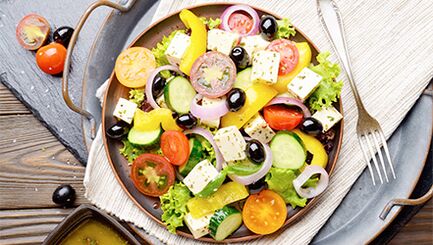The Mediterranean diet is a diet with a special reputation; in fact, it is a nutritional system that allows you to improve your health and get a slim figure as a bonus to protect against cancer and cardiovascular diseases. It is tasty, balanced and varied. The dishes of this diet are high in carbohydrates, lots of fish and seafood, all seasoned with aromatic spices and olive oil, complemented by a glass of red wine. Full of foodies! The Mediterranean diet for weight loss can also be used, although many people associate the countries of this region with pizza and pasta.
Diet for a long life

The term "Mediterranean diet" was first introduced to the world by American nutritionists Ansel and Margaret Keys, who followed the principles of the Mediterranean diet since the 1940s and lived to be no less than 97 and 100 years old, respectively. It is the only dietof the world, which was declared an intangible cultural heritage by UNESCO in 2013. Today, the Mediterranean diet is particularly popular among celebrities Victoria Beckham, Cameron Diaz, Eva Longoria and Jennifer Aniston.
There is only one downside: This approach to a healthy diet should be followed throughout life, but the diet has become increasingly popular since the mid-1990s.
Why "Mediterranean"? Studies have shown that attractive figures, longevity and good health of residents of Greece, northeastern Spain, Italy, Portugal, southern France and other countries in the Mediterranean region directly depend on their attitude to healthy eating.
Basic principles of nutrition
The content of carbohydrates, proteins and fats in the diet is 60%, 10% and 30%, respectively. But the main secret is that the fats and carbohydrates in the weight loss diet must be right. Namely durum wheat pasta, legumes and many types of whole grain bread. Also olive oil, avocado, fatty fish. Add a salad made from fresh vegetables and herbs – and you have a healthy lunch on the table.
There are no strict restrictions or methods, because the main principle of the system is that the products are divided into:
- included in the daily diet;
- consumed 1-4 times a week;
- allowed no more than 1-2 times a month.
Green
Each country has its own preferences for shades of green, but there are many of them on the table.
The Greeks use lettuce leaves as "green flatbread" and wrap vegetables, meat and grains in them. Horta is a popular snack - a mixture of herbs with butter or lightly fried.
The love of spinach comes from France; its neutral taste allows the use of greens both as a main course and as a filling of all kinds in culinary delights.
And Italians love broccoli, and the healthiest part of it is the leaves, which they eat raw, balancing the spicy flavor with tomatoes and cheese, and fried, seasoned with balsamic vinegar.
Dairy products
Dairy products have always been very popular in Mediterranean countries. When used correctly, animal milk is a source of calcium, vitamin D, protein and amino acids. And if France is a fan of ripe and aged cheeses, then Greece is a real lover of yogurt. There they are served with salads, meat, bread products and as independent dishes with or without fruits and herbs.
In the first rows of the benefits of cheese we find:
- Dietary goat cheese that is low in calories but rich in B vitamins and microelements as well as easily digestible proteins.
- Feta from sheep or goat milk helps control blood pressure, calms the nervous system and strengthens bones.
- Spicy Parmesan is the leader in the content of proteins, vitamins and amino acids.
- The silky provolone is additionally enriched with enzymes useful for humans, which gives it an unusual taste.
Vegetables
The variety of salads on the menu is quite to be expected in Mediterranean countries. Nutritionists have always emphasized the need for an abundance of vegetables in the daily diet. This will help improve digestion and heart function. Fresh vegetables with minimal processing, olive oil, the spice of herbs. . . And on your table there is a source of vitamins, organic acids, carbohydrates, proteins and fats - everything the body needs. Add a few slices of feta - this is what an authentic Greek salad looks like, the hallmark of Mediterranean cuisine.
meat and fish
If we analyze the relationship between meat and fish dishes, then despite delicacies such as Parma ham from Italy or ham from Spain, fish and seafood still dominate. Red meat is rarely found on the menu, because from seafood you get the maximum amount of saturated fatty acids, vitamins and microelements.
Fats
An important feature of the Mediterranean diet is the reduction of saturated animal fats in favor of healthier vegetable oils and unsaturated fats. Vegetable oils are olive oil, nuts, seeds. Unsaturated fats predominate in fatty fish with the highest content of polyunsaturated omega-3 fatty acids. It helps maintain the balance of vitamins and microelements in the body, and the bonus is elastic skin and shiny hair.

olive oil
Olive oil holds a special place on the menu of the Mediterranean diet. A few tablespoons of oil daily are a must in this unique approach to healthy eating. Don't be alarmed - some nutritionists recommend eating 60 grams for breakfast every day. Bread soaked in 40 gr. olive oil. This is not surprising since the fats in olive oil are similar to the fats in breast milk. Therefore, it is recommended to start introducing vegetable oils into complementary foods. For an adult gourmet, olive oil improves bone mineralization, improves digestion and stabilizes blood pressure. Olive oil contains oleic acid (up to 70% by volume). It is one of the unsaturated omega-9 fatty acids and acts as a powerful natural antioxidant. This improves metabolism and slows down the aging process. Olive oil also contains many vitamins E and K, which help improve immunity and regulate the body's energy processes.
You should also understand that not all olive oil is made according to the rules. Many unscrupulous manufacturers fill the market with substandard and counterfeit products. These oils can be improperly extracted and processed, destroying delicate nutrients and some fatty acids can even become rancid or toxic. Therefore, you should only choose high-quality oil with markings on the labelextra virginand best cold pressed. After all, the uniqueness of olive oil lies in the fact that it can be consumed raw and without any processing. People who are lucky enough to grow olives on their territory can press the olives by hand and enjoy the most valuable natural oil.
Spices, seasonings, aromatic oils
Mediterranean cuisine is particularly enriched by aromatic oils with herbs and spices. You can easily prepare them yourself at home - garlic-infused oil harmoniously refines pasta and sauces, mint oil emphasizes the freshness of salads and lemon oil adds sophistication to fish dishes. At the same time, salt consumption is significantly reduced, which also explains the healing effect, particularly on the cardiovascular system and the entire body. Feel free to use spices and seasonings in your recipes, experiment with combinations and dosages.
red wine
There is also a spicy feature of the diet: red wine is encouraged, but moderate alcohol consumption is emphasized. 10 to 50 ml per day is enough to improve heart function, cleanse blood vessels and just have a good mood.
Benefits of the Mediterranean Diet
- Products for this diet are minimally processed and have no added refined sugar.
These include olive oil, vegetables and fruits, legumes, nuts, durum wheat whole grains and small parts of animal products that are necessarily "organic" and non-perishable. There are practically no GMOs, artificial ingredients, preservatives, flavor enhancers and very little sugar. For dessertsMediterranean people use fruit or light homemade desserts with natural sweeteners such as honey.
The animal component of the diet is represented by moderate consumption of cow, goat or sheep cheese and yogurt as well as plenty of locally caught fish. This is a source of omega-3 fatty acids and other healthy fats, the "real" cholesterol, which strengthens the walls of blood vessels.
- Improvement of the cardiovascular system
High intakes of monounsaturated fats and omega-3 foods are associated with a significant reduction in all-cause mortality, particularly from heart disease. Many studies have shown the positive effects of a Mediterranean diet rich in alpha-linolenic acid (ALA) from olive oil, including a 30 percent reduction in the risk of death from cardiovascular disease and a 45 percent reduction inacute heart failure.
Warwick Medical School also found that people who regularly consumed extra virgin olive oil experienced greater reductions in blood pressure than people who predominantly consumed sunflower oil.
In addition, it is extremely rare for people in the Mediterranean region to have low levels of "good" cholesterol, as they typically consume lots of healthy fats in their natural diet.
- Lose weight healthily
This diet allows you to eat a very varied and tasty meal without feeling hungry. Therefore, you can follow this diet for a long time without any mishaps, regulate your weight and reduce your fat intake in a simple and natural way. There is scope for variety in the Mediterranean diet, regardless of whether you prefer to increase the proportion of carbohydrates or value high-quality protein products from animal and, above all, plant sources. In any case, this diet helps regulate weight gain, control blood sugar levels, improve mood and maintain consistently high energy levels.
- Cancer prevention
According to researchers from the Department of Surgery at the University of Genoa in Italy, a balance of essential omega-6 and omega-3 fatty acids, high fiber content, antioxidants and polyphenols in fruits, vegetables, olive oil and wine protect DNA from damage and stop cell mutations, reduces inflammatory processes and delays tumor growth. Olive oil also reduces the risk of colon and colon cancer.
- Treatment and prevention of diabetes
The Mediterranean diet controls excess insulin, the hormone that regulates blood sugar, causes weight gain and maintains our weight even while dieting.
There is ample evidence that the Mediterranean diet may serve as an anti-inflammatory diet that may help fight diseases associated with chronic inflammation, including metabolic syndrome.
A low-sugar diet with a high proportion of fresh foods and fats is part of the natural lifestyle for diabetics.
A Mediterranean diet style helps prevent blood sugar peaks and valleys. Carbohydrates - in the form of whole grain bread or durum wheat pasta, often combined with olive oil or cheese, lots of greens and vegetables - are an excellent source of energy for several hours without significant sugar spikes and an early feeling of hunger.
- Protecting cognitive health and promoting good mood
Healthy fats like olive oil and nuts are known to help combat age-related cognitive decline. They can counteract the harmful effects of toxicity, free radicals, inflammatory diets, or food allergies that can contribute to brain dysfunction. Cognitive disorders can occur when the brain does not receive enough dopamine, an important chemical necessary for proper body movement, mood regulation and mental function.
Probiotic foods like yogurt and kefir promote healthy gastrointestinal function, which is also linked to cognitive function.
Therefore, the Mediterranean diet can be a natural treatment and prevention against Parkinson's, Alzheimer's and age-related dementia.
- Promotes longevity
Back in 1988, a study in Lyon asked heart attack patients to follow a Mediterranean diet high in monounsaturated fat or a standard diet with a significant reduction in saturated fat. Four years after the study began, results of a follow-up study showed that patients in the first group had a 70% lower risk of suffering from heart disease and also a 45% lower risk of dying from any cause than those in the firstGroup the group with a standard diet. At the same time, there was no big difference in total cholesterol levels, which proved the absence of a direct connection with heart disease. The results were so impressive and groundbreaking that the study was stopped early for ethical reasons so that all participants could continue to follow a Mediterranean diet for maximum health and longevity.
- Helps reduce stress and relax
Chronic stress significantly reduces quality of life and negatively impacts weight and overall health. The Mediterranean diet encourages you to spend more time in nature and sleep well. This is a great way to reduce stress and therefore prevent inflammation. And there is also more time to laugh, dance, relax and pursue hobbies.
- Fights depression
A 2018 study published in the journal Molecular Psychiatry found that a Mediterranean diet reduced the risk of depression. Inflammation is often cited as a root cause of many disorders and psychiatric illnesses, including schizophrenia, obsessive-compulsive disorder, depression, anxiety, fatigue and social withdrawal. A nutrient-rich diet, on the other hand, helps protect the brain from organic and functional changes. Other diet and lifestyle changes, such as getting enough sleep, eating mindfully, choosing your menu in advance, and limiting stress, lead to stable mental health.




What is possible and how often
If you decide to try this popular and in many ways unique nutritional system, then from now on you should have the following products on your table every day:
- Fresh fruits (apples, bananas, pears, citrus fruits, figs, peaches, apricots, berries, melons, watermelons);
- Vegetables (mainly non-starchy vegetables such as tomatoes, eggplants, artichokes, all types of cabbage), vegetables (especially leafy vegetables – spinach, lettuce);
- whole grain products (brown rice, rye, barley, corn, buckwheat, whole oats, wheat and products made from them - bread and pasta);
- Legumes and beans (lentils, chickpeas, beans, peas, peanuts);
- root vegetables (yams – sweet potatoes, turnips, yams, parsnips, Jerusalem artichokes);
- Nuts and seeds (walnuts, almonds, hazelnuts - hazelnuts, macadamia nuts, cashews, sesame seeds, sunflower seeds, pumpkin seeds);
- You can minimize the amount of salt in your diet with spices and herbs (garlic, nutmeg, cinnamon, pepper, basil, mint, rosemary, sage);
- Vegetable fats (olive oil, pure avocado and oil from it);
- Pure water about 2 liters per day, tea or coffee are allowed, but sweetened drinks and fruit juices should be avoided;
- Dairy products – cheese, yogurt or kefir – in moderation;
- Red wine in moderation (but this is completely optional).
Each week you will need:
- Fish and seafood (prefer wild fish species over artificially farmed ones), shrimp, oysters, clams, mussels, crabs - at least 4 times a week;
- Eggs – in moderation, 2-4 times a week;
- Potatoes – in moderation;
- Some sweets.
Every month you can eat:
- Red meat;
- Poultry (chicken, duck, turkey) and lean meats (rabbit, ham, pork tenderloin).
You should avoid the following in your diet:
- Refined sugar and products containing it (ice cream, candy, drinks, table sugar);
- Heavily processed grains (white bread, soft wheat pasta, polished grains);
- trans fats (margarines and products containing them);
- Refined oils (all types, including soy, rapeseed and cottonseed);
- Processed meat products (sausages, sausages, semi-finished products);
- Products with additional processing or enrichment (labeled as "low fat, " "enriched, " "refined").
Menu for the week
A big advantage, but at the same time a disadvantage, of the Mediterranean diet system is the lack of strict rules and a clear nutrition plan. To make your orientation easier, here is the menu for the week, adapted to the food basket of our strip.
Monday
- Breakfast – yogurt with muesli and berries.
- Lunch – cabbage soup and roast.
- Dinner – Vegetable salad with eggs, dressed with olive oil and lemon juice.
- Snacks – fruit salad made from seasonal fruits, a handful of nuts.
Tuesday
- Breakfast – oatmeal with flax seeds, honey and banana slices.
- Lunch – Lasagna with vegetables.
- Dinner – baked eggplant with feta cheese and a cheese sandwich.
- Snacks – probiotic yogurt, grapes and popcorn.
Wednesday
- Breakfast – Berry pudding with Greek yogurt and chia seeds.
- Lunch – whole grain sandwich with vegetables.
- Dinner: Grilled salmon served with brown rice and vegetables.
- Snacks – roasted pumpkin seeds, celery with peanut butter.
Thursday
- Breakfast – Omelette with tomatoes, peppers, onions, broccoli and feta cheese.
- Lunch – pureed spinach soup with sour cream, cream or Greek yogurt, oven-baked potatoes.
- Dinner – shrimp salad dressed with olive oil.
- Snacks – various tropical fruits, carrots with hummus.
Friday
- Breakfast – oatmeal with dried fruits and nuts.
- Lunch – vegetable soup with chicken broth.
- Dinner – fried or baked fish.
- Snacks – Kale or zucchini chips, olives.
Saturday
- Breakfast – Sweet potato casserole with spinach and cheese.
- Lunch – Mediterranean whole grain pizza with cheese, vegetables and olives.
- Dinner – salmon with buckwheat, cabbage salad.
- Snacks - fruits, cottage cheese with dried fruits.
Sunday
- Breakfast – yogurt with bifidobacteria with chopped fruits and nuts.
- Lunch – tuna salad with olive oil.
- Dinner – Greek salad with cucumbers, tomatoes, black olives, spinach, feta cheese, dressed with olive oil, a piece of lean steak.
- Snacks – various nuts, fruit salad.
Disadvantages and harms of nutrition
The disadvantage of this nutritional system is, first of all, the need to change your eating habits - to give up many processed and refined products in favor of high-quality and often expensive products. In addition, it is not yet known which factor will be more important – high cost or the habit of the previous diet.
Also, this diet may not be suitable for people with individual intolerance and allergy to seafood. People with stomach and intestinal ulcers should approach their menu selection with caution, given the high fiber content in the daily menu. It is also worth avoiding dietary red wine for pregnant women and other people for whom alcohol, even in small quantities, can be harmful.

Lose weight with the Mediterranean diet
Many people doubt whether it is possible to lose weight on such a diet? In fact, this gentle diet does not give immediate results and therefore is not suitable for correcting severe obesity. If the main goal of the diet is weight loss, then physical activity must definitely be included. Not every diet that involves dietary restrictions will allow you to get a full workout. And here there is a pleasant bonus: it is the Mediterranean diet that gives you strength for sports. This improves weight loss results, provides a beautiful and healthy figure and improves health.
Those who have decided to lose weight using this method may find the lack of a strict menu inconvenient. You need to calculate for yourself how many calories you need in order not to feel hungry, but at the same time lose weight, independently relating physical activity and the amount of food consumed. Still, most dieters find this convenient because strict restrictions are harder to achieve.
Summary
The Mediterranean diet is not a diet in the traditional sense, but rather a specific nutritional system that people can adhere to throughout their lives. It's important to eat three nutritious meals and two snacks throughout the day so you don't go hungry. This is thanks to the unique diet – high consumption of olive oil, fruits, nuts, vegetables and grains; moderate consumption of fish and poultry; low consumption of dairy products, red meat and sweets; and red wine in moderation – reduce the incidence of chronic diseases on the way to a long life.





























